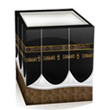Passing directly in Front of a Worshipper in Prayer
- Details
- Category: Sheikh Bin Baz
- Published on Sunday, 03 November 2013 11:46
- Hits: 808
Passing directly in Front of a Worshipper in Prayer
Question:
Is it permissible to pass directly in front of a worshipper in prayer in the mosque?
Answer:
It is forbidden to pass directly in front of a worshipper in prayer, whether he has taken a Sutrah or not, according to the general meaning of the Hadith in which the Prophet (sallallaahu alaihi wa sallam) said: If the one who passes in front of a worshipper in prayer knew the sin he was committing, he would wait forty (years), and that would be better for him then passing in front of the worshipper in prayer. [1] A number of scholars of Islamic jurisprudence (Fiqh) have made an expiation for prayer in the Sacred Mosque in Makkah from this ruling, permitting people to pass in front of the worshippers there, based on the narration of Kathir bin Kathir Al-Muttalib, from his father, from his grandfather, who said: I saw the Messenger of Allaah (sallallaahu alaihi wa sallam) praying opposite the stone and the people were passing in front of him, and in another narration from Al-Muttalib, it was reported that he said: I saw the Messenger of Allaah (sallallaahu alaihi wa sallam) when he had completed his seven (circuits of the Kabah) go towards the corner which was between him and the covered passage and pray his two Rakahs at the edge of the place where the people were making Tawaf and there was no one between him and the Tawaf... Although the chain of narration for this Hadith is weak, it supports what has been narrated in the traditions, and the general meanings of the evidences for lifting of difficulties, since preventing a person passing in front of a worshipper in the Sacred Mosque causes difficulty and hardship in most cases.
[1] Al-Bukhari no. 510 and Muslim no. 507
Shaykh `Abdul-`Azeez Bin Baz





















